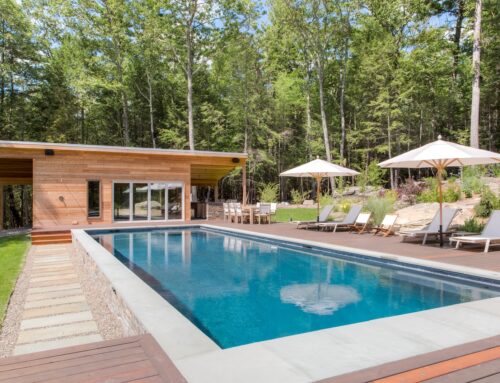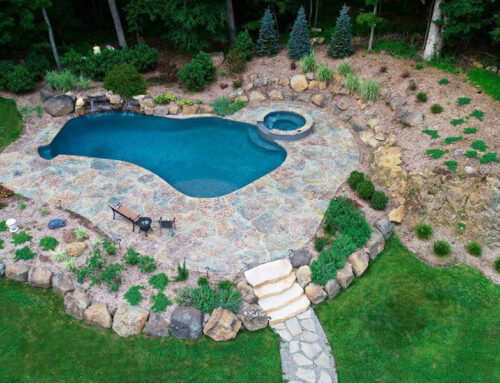It’s about time to close the swimming pool, but try to hold back the tears — the salt could throw off your pool’s chemical balance.
We’re kidding, of course, but if you’re thinking, “Who cares about the chemical balance? I’m closing the pool anyway,” it’s a good thing you’re here.
Even though your pool will be covered and quiet for the next few months, it’s important to maintain the water and chemical balance before you close it. Closing your pool properly can save you a lot of work and expense when it comes time to open it back up for the summer.
Let’s take a look at why chemical balance is important, and what you should do before you pack away your swimsuit.
Why Worry About Pool Chemical Balance Over The Winter?
While you’re inside by the fireplace, your pool water will still be in constant contact with the surfaces of the pool. The chemical balance matters.
Water with low calcium levels can pull certain chemical compounds out of the liner that keeps the vinyl pliable. That can shorten its life.
Low calcium levels in a gunite pool can cause etching in your pool’s surface and crumbling plaster. Low pH leads to surface corrosion. If the alkalinity is too high, you’ll be greeted with a cloudy pool in the spring.
All good reasons to get the balance right before you close the pool.
What Is The Ideal Chemical Balance For A Swimming Pool?
Pool water balancing is the relationship between different chemical measurements in your pool water. Your pool water is constantly changing, affected by all sorts of things, from weather to oils to dirt.
Filtration and disinfection remove these contaminants, but that doesn’t balance your water.
A pool that’s “balanced” has proper levels of pH, total alkalinity, and calcium hardness.
pH is a measure of how acidic or basic the water is. The ideal pH range is 7.2 – 7.8.
A close cousin of pH, the level of alkalinity in the water is a measurement of all carbonates, bicarbonates, hydroxides, and other alkaline substances found in the pool water. The idea range for alkalinity is in the 80-120 ppm (parts per million) range for gunite pools and 125-170 ppm for vinyl pools.
Calcium hardness is a measure of how “hard” or “soft” the water is. The recommended range for calcium hardness is 200-400 ppm.
How To Maintain The Chemical Balance In A Swimming Pool
Water Balancing chemicals are important because they prevent damage to the pool or poor sanitation from chemical levels that are too high or too low.
During the swimming season, you should test your pool water two to three times a week, adding chemicals as needed.
Run the pump after adding chemicals, to help distribute them. Add one chemical at a time, or add them into different areas of the pool.
Test and adjust in this order: First alkalinity, then pH, then calcium.
How To Balance Your Pool Water Before Closing
About five days before you plan to close the pool for the winter, follow these steps:
Balance the Pool’s Water Chemistry
- Adjust the pH to a level between 7.2 and 7.8.
- Adjust the alkalinity to 80 to 120 ppm.
- Adjust the calcium hardness to 200 to 400 ppm.
Shock the water. Use an extra strong chlorine or a non-chlorine substitute to kill the bacteria and algae that may be living in the pool.
Use a shock product with at least 65 percent sodium hypochlorite or a non-chlorine substitute of equivalent strength. Fill a five-gallon bucket with pool water, add the instructed amount of shock granules for the size of the pool, and pour it into the pool away from the pool skimmer water outlets while the filtration system is running.
After a few days, once the chlorine level returns to between 1 and 3 parts per million, add a winterizing algaecide. This will kill existing algae and prevent more from blooming.
Algae is bad news — it can cause the pool to become discolored, give it a bad smell and clog the filter, so this algaecide step is important.
Use an extra-strength algaecide to prevent algae from blooming all winter.
Don’t Forget The Feeder
If you have a chemical feeder, don’t forget to drain and empty it as part of your pool closing routine. If you leave chemicals in your chemical feeder over the winter, you might damage your equipment.
Leave Your Pool Closing To Neave
Balancing your pool water and closing your pool safely and securely will prevent unpleasant surprises when you re-open it next year. But it’s time-consuming and sort of a hassle.
Why not let the experts at Neave Pools take care of the chore for you?
Proper pool closing can reduce maintenance and repair costs for your pool, which is why Neave Pools offers it as part of a complete seasonal service that can include pool opening and closing, power washing, the introduction of chemicals, weekly visits for cleaning and chemical testing, winter check-ups, and more.
Pool opening and closing services are also available as a stand-alone service.
Let Neave handle your pool closing, and you’ll know your pool is safely tucked away, ready for a simple and easy reopening when the weather allows.
If you’re in Hudson Valley, call (845) 463-0592. Westchester, call (914) 271-7996. Cold Spring, call (845) 463-0592, and in Connecticut, call (203) 212-4800. Or fill out the handy web form on this page, and we’ll get in touch with you to schedule a complimentary swimming pool consultation.

























